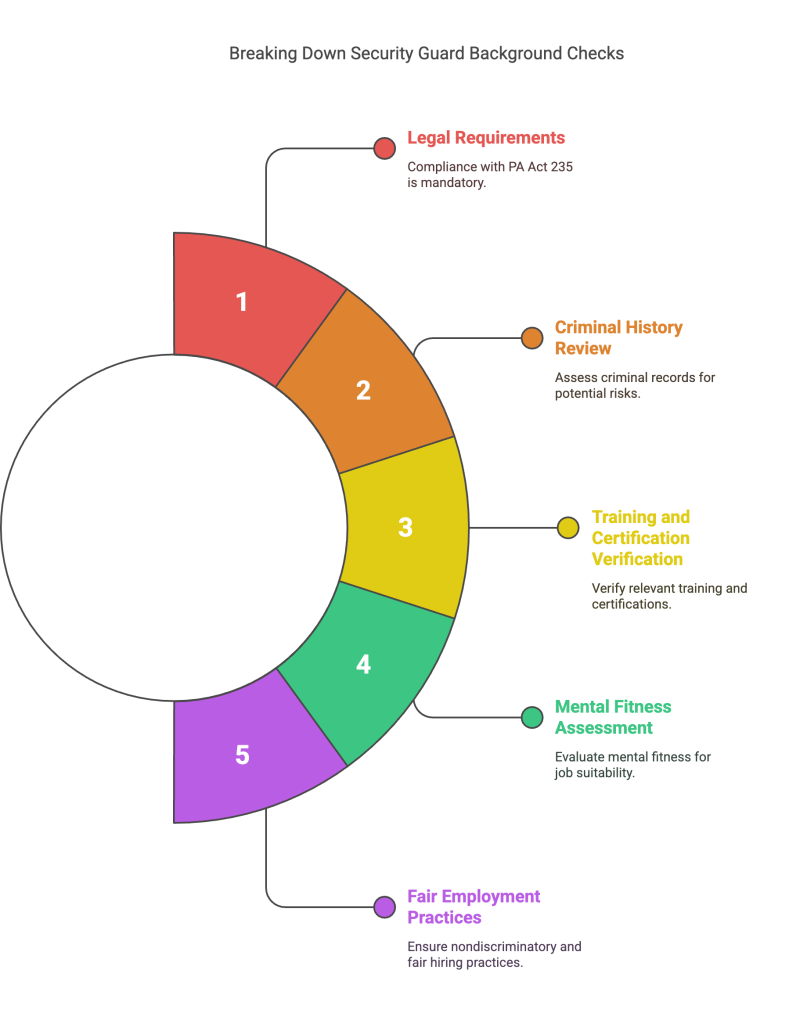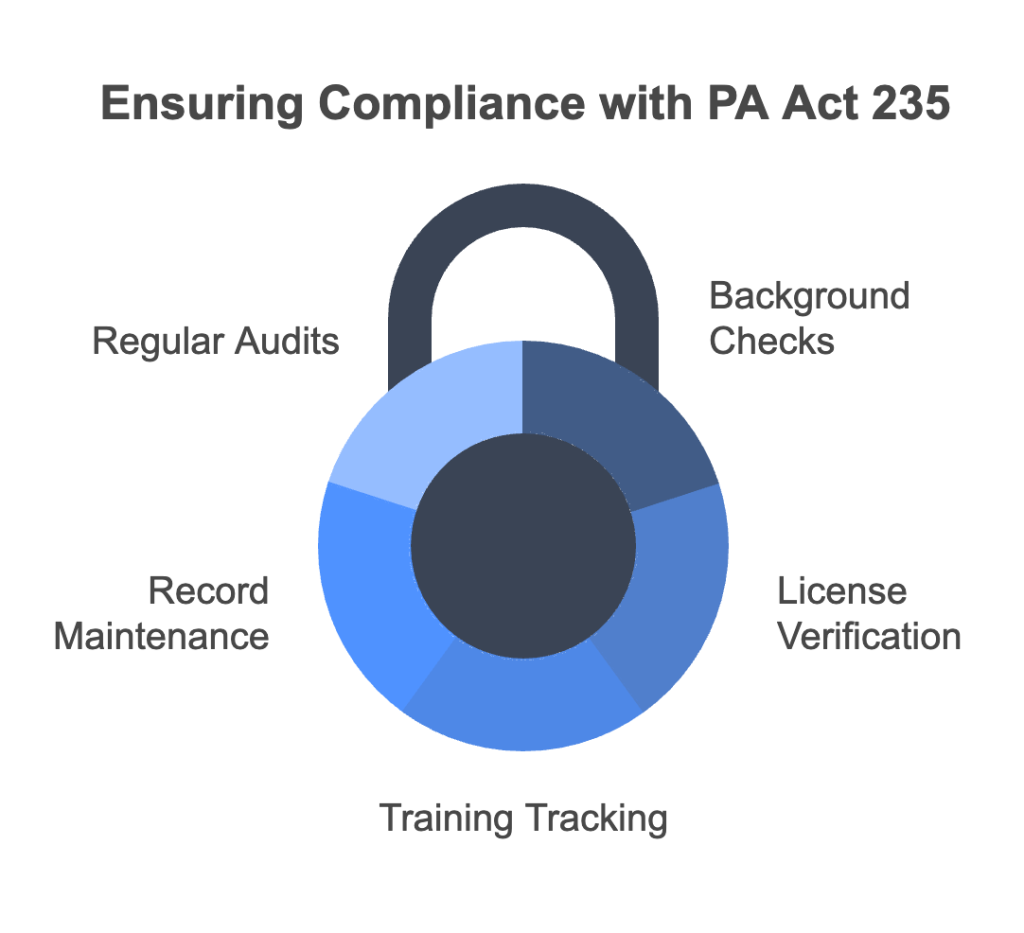Demand for security professionals in Pennsylvania is on the rise. As threats evolve, so does the need for stringent vetting processes to ensure only the most qualified individuals serve as armed security personnel. PA Act 235 is at the forefront of these efforts, providing a structured framework for background checks and training requirements.
This guide helps you understand the PA Act 235 process, offering insights into its requirements and implications. Whether you're an applicant seeking licensure or an employer striving to follow compliance, knowing these details is crucial.
We will explore the core elements of PA Act 235, focusing on licensing, disqualifications, and mental health evaluations, each a pivotal component in safeguarding public safety and professionalism in the security industry.
Key Takeaways
- Demand for armed security professionals in Pennsylvania is increasing, with PA Act 235 establishing the framework for background checks and training requirements.
- PA Act 235, or the Lethal Weapons Training Act, requires that armed security personnel meet rigorous standards in training, mental health, and criminal history checks.
- Employers must conduct comprehensive background checks under PA Act 235 to ensure only qualified individuals serve, thereby avoiding legal issues and enhancing public safety.
- Securing a license under PA Act 235 involves meeting training requirements, passing background checks, and undergoing mental health evaluations to guarantee readiness for carrying arms.
- Compliance with PA Act 235 protects both businesses and the public, with regular audits and staying informed on legal updates being crucial strategies for avoiding potential fines or legal issues.
What is PA Act 235?
PA Act 235, formally known as the Lethal Weapons Training Act, is a Pennsylvania statute that governs the certification of security personnel who carry firearms or other lethal weapons while performing their duties. The act ensures that armed security guards meet rigorous standards before they are granted the authority to carry weapons in a professional capacity.
The legislation was enacted to address the growing need for professionalism and accountability among security personnel. By establishing strict requirements for training, mental health evaluations, and background checks, PA Act 235 aims to protect public safety and maintain high standards within the security industry.
Over the years, the act has evolved, adapting to changes in societal norms and security threats. Originally focused primarily on the physical and weapons-handling training of guards, amendments to the act have increasingly emphasized comprehensive vetting procedures. These updates reflect a broader understanding of the responsibilities and risks associated with carrying lethal weapons in public settings. As the security landscape continues to change, PA Act 235 serves as a foundational framework to ensure that only qualified individuals are entrusted with armed security roles in Pennsylvania.
The Importance of Security Guard Checks
Thorough background checks for security guards are critical for maintaining public safety. When you hire someone to protect people and property, you want to ensure they can be trusted to handle the responsibilities of the job, including carrying a firearm. By conducting a comprehensive background check, you can help prevent dangerous individuals from entering positions that require significant trust and responsibility.
For employers, vetting candidates carefully is not just a precautionâit's a legal responsibility under PA Act 235. This law mandates specific checks to ensure only qualified individuals serve as armed security officers. You must adhere to these requirements, which include reviewing criminal history, verifying training and certifications, and assessing mental fitness. Failing to comply can result in legal repercussions, put your business at risk, and compromise community safety.
Legal considerations are also part of the equation. The Equal Employment Opportunity Commission (EEOC) provides guidance on conducting background checks in a way that's fair and nondiscriminatory. Itâs important to balance the information gathered with federal anti-discrimination laws. This means using any findings to make fair employment decisions, considering the nature of any convictions and their relevance to the job.

Are you ensuring your background check process is thorough and compliant with PA Act 235? Taking time to refine your approach pays off, offering peace of mind for you and those you serve.
Pennsylvania Armed Security Licensing
Securing a license under PA Act 235 for armed security work involves a structured process aimed at ensuring only qualified candidates are entrusted with critical security roles. Here's how it unfolds:
Licensing Requirements
- Background Checks: The first step in obtaining licensure involves an exhaustive background check. It focuses on criminal history, past employment, and verifying personal details. Expect this to be thorough; it's designed to weed out individuals who might pose a threat if given responsibility for public safety.
- Training and Certification: Applicants must complete a mandatory training program. This usually includes a mix of classroom instruction and hands-on exercises. Subjects covered range from firearms safety and handling to conflict resolution and defensive tactics. Completing this training is non-negotiable; it proves you're serious about your role and responsibility.
- Continuing Education Requirements: Certification doesn't end once your license is secured. You're required to pursue ongoing education to stay current with legal updates and evolving best practices in security. This keeps skills sharp and knowledge relevant.
Application Process
- Initial Application: Start by filling out the official application form for a PA Act 235 license. Make sure your details are accurate and complete to avoid processing delays.
- Submission of Documents: Gather all necessary documents, such as proof of identity, training completion, and any prior certifications. Missing paperwork can slow down the process or lead to denial.
- Fingerprinting and Fees: Submit to a fingerprinting session for your background check. This step usually requires a fee, so check current rates to budget accordingly.
- Testing and Evaluation: You'll need to pass a written exam that tests theoretical understanding of your role. Practical evaluations may also be part of the process.
- Await Approval: Once everything is submitted and exams are passed, itâs a waiting game. Approval times can vary, so try to be patientâbut proactive about checking your status.
Questions or uncertainties are common, but the Pennsylvania State Police department offers resources and assistance. Reach out if you need clarification during any step. This approach ensures you're not only compliant but also well-prepared for your role as an armed security professional in Pennsylvania.
Act 235 Disqualifications
Certain criteria can disqualify an applicant from obtaining a PA Act 235 license, crucial for armed security roles in Pennsylvania. A significant factor is the applicant's criminal history. Felony convictions and certain misdemeanor offenses can lead to automatic disqualification. This includes crimes involving violence, theft, or drug-related offenses. These measures help ensure that those entrusted with security duties do not pose a risk to public safety.
Disqualifications have serious professional and legal consequences. For applicants, it means the end of their pursuit of a career as an armed security guard under PA Act 235. For employers, hiring unlicensed individuals can lead to legal trouble, financial penalties, and reputational damage. Employers must adhere to these standards to maintain a secure and trustworthy workforce.
Consider your history carefully when applying. If there's a blemish on your record, seek legal advice on whether it can be addressed or mitigated. Re-assess your eligibility and explore other roles that might align better with your background. Understanding these disqualifications can save time and prepare you for the outcomes of your application process.
The Role of Mental Health Evaluation in PA Act 235
Mental health is a crucial part of the PA Act 235 process. It's not just about whether someone can handle a weapon physically but also whether they can do so with the right mindset. The evaluation seeks to ensure applicants do not pose a risk to themselves or others when armed.
During a mental health evaluation, applicants should expect to meet with a licensed psychologist or psychiatrist. This professional will assess various factors, including stress response, impulse control, and decision-making capabilities. You might be asked about your personal history and past experiences, particularly those involving conflict or trauma. There's no definitive "pass" or "fail" score, but the evaluator looks for signs of stability and judgment.
Exceptions to mental health evaluations are rare and typically subject to stringent rules. For instance, an applicant with recent evaluation results from another credible source might get a waiver, but this is not the norm. Always expect to disclose if you have such documents beforehand.
Comprehending the importance of this evaluation can make the difference between a successful application and a prolonged process. It's not just a box to tick; itâs a measure of your capacity to uphold the responsibilities that come with being armed. Are you prepared for such scrutiny?
Compliance and Enforcement
Making sure your business complies with PA Act 235 isn't just a best practiceâit's mandatory. You need to conduct thorough background checks and ensure your armed security personnel meet all the statute's requirements. This includes verifying their licenses, keeping track of their training, and maintaining up-to-date records.
Regular audits can be instrumental. Set up a schedule to review your compliance status. If you find any gaps, address them immediately. This proactive approach not only protects your company from legal issues but also maintains your reputation as a responsible employer.
The consequences for non-compliance are serious. If your organization fails to adhere to PA Act 235, you may face fines and possibly lose your license to operate. Additionally, if an incident occurs due to inadequate checks, your legal liability could increase significantly.

Stay informed and stay diligent. Review updates to the legislation regularly. Engage with legal professionals who specialize in employment law to ensure you're on the right track. By prioritizing compliance, you safeguard your business and contribute to a safer community.
Resources
Navigating the requirements of PA Act 235 can be complex, but you donât have to do it alone. Our blog at GCheck's blog is a valuable resource for getting a deeper understanding of the background check process. We cover a range of topics that can help you fully grasp the ins and outs of compliance and best practices.
For more comprehensive information, federal guidelines offer an essential perspective. Visit the U.S. Equal Employment Opportunity Commission (EEOC) for federal guidance on background checks. It's a solid starting point to ensure your vetting processes align with both state and federal laws.
If you need clarity on mental health evaluations, Mental Health America provides insights into mental health assessments, which are a key component of the PA Act 235 requirements.
Dive into these links to stay informed, align with compliance standards, and make well-informed decisions when it comes to employing armed security personnel in Pennsylvania.
Conclusion
Understanding PA Act 235 and its background check requirements is pivotal for maintaining security integrity in Pennsylvania. As we've explored, these checks help ensure that armed security guards are thoroughly vetted, licensed, and mentally fit for their roles. Employers must remain diligent in their compliance efforts, adhering to both state and federal guidelines.
For applicants, familiarity with the licensing process, awareness of disqualification criteria, and undergoing necessary evaluations are critical steps. Ultimately, these efforts contribute to safer communities and enhance the trustworthiness of the security profession. By prioritizing these stringent measures, both employers and applicants uphold the standards set forth by PA Act 235, reinforcing public safety and confidence in security operations across the state.
Frequently Asked Questions (FAQs)
What disqualifies you from being a security guard in PA?
Criminal convictions, especially felonies, can disqualify you. Also, lack of a high school diploma or equivalent, drug addiction, or severe mental health issues might prevent eligibility.
How long does Act 235 certification take in Pennsylvania?
The process typically takes several weeks, including training and background checks.
Can misdemeanors affect security guard employment in PA?
Yes, certain misdemeanors, especially those involving violence or dishonesty, can impact your chances.
Does Pennsylvania accept out-of-state security licenses?
No. Pennsylvania requires state-specific licensing for security guards.
Are mental health records reviewed for PA Act 235?
Yes, mental health records are part of the background check process.
How much does Act 235 certification cost in PA?
It generally costs around $150 for application and testing, excluding training fees.
Can you appeal an Act 235 denial in Pennsylvania?
Yes, you can appeal by following the procedures outlined in the denial notice.
Do PA security guards need drug tests?
Drug tests may be required by employers, though not specifically mandated by state law.
How often must PA security guards renew certifications?
Act 235 certification must be renewed every five years.
Are expunged records considered for Act 235?
Expunged records are not considered during your application process.
Do security guards in PA need a high school diploma?
Yes, most employers require a high school diploma or equivalent.
What training is required for security guards in PA?
Training includes basic security principles and, for armed guards, firearm handling and safety.
How do you find Act 235 training programs?
Search online for Pennsylvania certified training schools or contact local security companies for recommendations.
Do security guards in PA need to wear uniforms?
Yes, most employers require security guards to wear uniforms for easy identification.
Definitions
Background Check
A background check reviews a candidateâs criminal history, employment records, and personal details. Employers use it to ensure applicants meet legal and company standards before hiring. For PA Act 235, this step verifies that armed security personnel do not pose a risk to public safety.
Licensing Requirements
These are the mandatory steps an applicant must complete to receive a PA Act 235 license. They include background checks, training, fingerprinting, and mental health evaluations. Meeting these standards ensures only qualified individuals carry weapons in security roles.
Training and Certification
This process equips applicants with the knowledge and skills needed for an armed security position. It includes classroom learning, firearms safety, and conflict resolution. Successful completion is required for PA Act 235 licensure and ongoing professional development.
Mental Health Evaluation
A mental health evaluation determines whether an applicant is fit to carry a weapon. A licensed psychologist or psychiatrist assesses decision-making skills, impulse control, and emotional stability. This step helps prevent individuals with serious mental health concerns from holding armed security roles.
Compliance
Compliance means following all legal and regulatory requirements under PA Act 235. Employers must verify that security personnel meet licensing, training, and background check standards. Failing to comply can lead to legal penalties and increased business liability.

GCheck Editorial Team
Meet the GCheck Editorial Team, your trusted source for insightful and up-to-date information in the world of employment background checks. Committed to delivering the latest trends, best practices, and industry insights, our team is dedicated to keeping you informed.
With a passion for ensuring accuracy, compliance, and efficiency in background screening, we are your go-to experts in the field. Stay tuned for our comprehensive articles, guides, and analysis, designed to empower businesses and individuals with the knowledge they need to make informed decisions.
At GCheck, we're here to guide you through the complexities of background checks, every step of the way.





